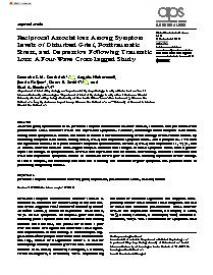Reciprocal Associations Among Symptom Levels of Disturbed Grief, Posttraumatic Stress, and Depression Following Traumatic Loss : A Four-Wave Cross-Lagged Study
Disturbed grief, operationalized as persistent complex bereavement disorder (PCBD), correlates with yet differs from posttraumatic stress disorder (PTSD) and depression symptoms. However, knowledge about temporal associations among these symptoms is limited. We aimed to enhance our understanding of the etiology of loss-related distress by examining temporal associations among PCBD, PTSD, and depression symptom levels. Dutch people (N = 172) who lost significant other(s) in a plane disaster completed questionnaires for PCBD, PTSD, and depression 11, 22, 31, and 42 months after the disaster. Cross-lagged analyses revealed that changes in PCBD symptom levels have a greater impact on changes in symptom levels of PTSD and depression than vice versa. Our findings contradict the notion that PTSD and depression symptoms should be addressed before grief in treatment. Pending replication of our findings in clinical samples, we tentatively conclude that screening and treatment of grief symptoms has potential value in preventing long-lasting distress.
Geachte bezoeker,
De informatie die u nu opvraagt, kan door psychotraumanet niet aan u worden getoond. Dit kan verschillende redenen hebben,
waarvan (bescherming van het) auteursrecht de meeste voorkomende is. Wanneer het mogelijk is om u door te verwijzen naar de bron
van deze informatie, dan ziet u hier onder een link naar die plek.
Als er geen link staat, kunt u contact opnemen met de bibliotheek,
die u verder op weg kan helpen.
Met vriendelijke groet,
Het psychotraumanet-team.
In: Clinical Psychological Science ; ISSN: 2167-7026 ; eISSN: 2167-7034 | november
https://doi.org/10.1177/2167702619858288


